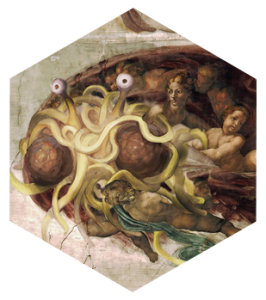February 15, 2015

By Andrea Castillo
To many non-believers, religious expression and practice appear downright irrational, if not inhumane. A perhaps less-than-Bayesian belief in a higher power is one thing; the nastiness of genital mutilation, pogroms, sexual repression, social coercion, and Christian rock music is quite another. For millenia, humans have had no choice but to submit to these belief systems or suffer the consequences. The liberalizing aftershocks of the Enlightenment provided atheists at last with a bit of breathing room to air their heretofore enveloped theses on the power and inefficacy of Big Religion. And air they did!
We WEIRDos live in no better time to shirk the rules and fanatics of the world’s most popular deities. Maybe God really is not Great. But is it true that religion poisoned everything? Was organized religion merely a haven for shysters, idiots, and cowards? Is it true that human decency preceded and was tainted by religion? Or, to paraphrase the esteemed horseman Dawkins, might this new dogma simply teach us to be satisfied with not understanding religion?
Evolutionary psychologist Ara Norenzayan agrees that religion blinds, but he is also interested in understanding how it can bind. His recent book, Big Gods: How Religion Transformed Cooperation and Conflict, analyzes religion’s role in promoting the age-old mystery of large-scale anonymous cooperation. More synthesis than thesis, Norenzayan blends consilient experimental evidence supporting cognitive adaptive theories of religion, as proposed by David Hume, with social bonding approaches, as articulated by Emile Durkeim and David Sloan Wilson, to explain the dual puzzles of religious transmission and macrosocial harmony. In short, Norenzayan argues that our brains are built for believing and this belief encourages belonging and cooperation.
Our brains might have created God, but natural selection “created” our brains. We unwittingly labor along the neurological limits of nature’s economy. Following Hume, Norenzayan believes religion is a predictable side-effect of our common human cognitive architecture. Our shared theory of mind leads us to intuit that agents cause inexplicable acts; lacking a sophisticated natural knack for meteorology, we assume that some greater power caused the flood to decimate our village. These supreme beings are rarely abstract and always watchful; never milquetoast but often marginally counterintuitive. Ever the opportunists, humans quickly set out to get on the gods’ good sides. The beliefs and practices performed to exalt these gods eventually translated into cultural norms that uplifted entire civilizations.
This fortunate cognitive compatibility provided early humans with a life-hack against collective action and freerider problems. Building on Durkeim and Wilson’s cultural approach, Norenzayan presents ample experimental evidence that a shared belief in a watchful, punitive deity increases prosocial behaviors and mutual trust, even among adherents of different religions. Watched people, after all, are nice people–the threat of eternal damnation looms large among the faithful. This supernatural surveillance allowed for cooperation and trade among would-be Hobbesian adversaries. The higher the level of cooperation, the greater the extent of the market. The Bigger the God, the Bigger the Group: Hall of Famers Judaism, Christianity, and Islam boast a particularly winning combination of prosocial cultural quirks.
Of course, this cooperation came with costs–the understandable objects of most New Atheist contentions. Signaling devotion often demanded social conformity and expensive taxes on time, thought, and income. Interreligious conflict was routine and bloody. Belief was socially monitored and strictly enforced. Heresy threatened to undermine the critical focal point for large scale cooperative behavior–not to mention chip away at the power and revenue streams of religious administrators. One man’s free thinker was another’s free rider. Non-belief has been taboo for longer than it hasn’t and has been cruelly punished for almost as long. Distrust of atheists remains unjustifiably high throughout the world and (strangely) the United States, but atheists are no less moral or trustworthy than the religious. They merely derive their prosocial behaviors from the new boss in town: In the WEIRD world, Big Gods have been replaced by Big Governments.
The state, that other necessary evil in human development, is a watchful, punitive secular deity that fosters large-scale cooperation among and between groups. Seamlessly syncing with our old hardware, it has almost entirely supplanted the former glory of religion in much of the developed world and foists constitutional training wheels on the rest of it. It is an abstraction personified through national myths and political romance. New Atheists are astute to point out the flaws of the older model, but many embrace the new substitute too readily. Religion, for all of its flaws, at least reinforces a constrained vision of humanity among the faithful. Can an order built on the backs of secular gods resist the temptation of scientism? I, for one, am not optimistic–our new gods, with their publicists, handlers, and technocrats in tow, present an appealing front. In Rationalism we trust.
Share this Post

